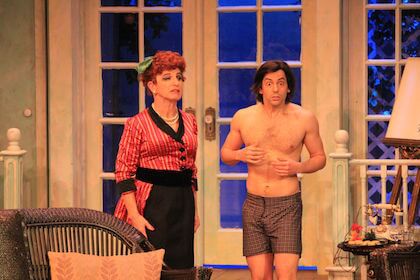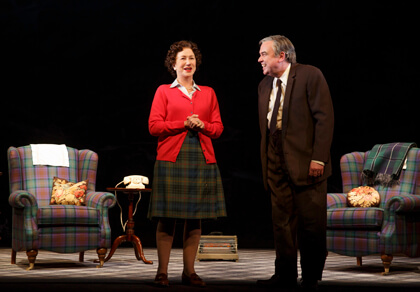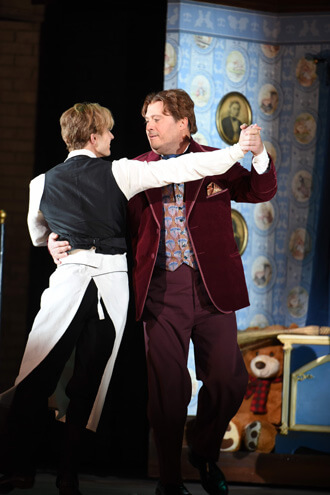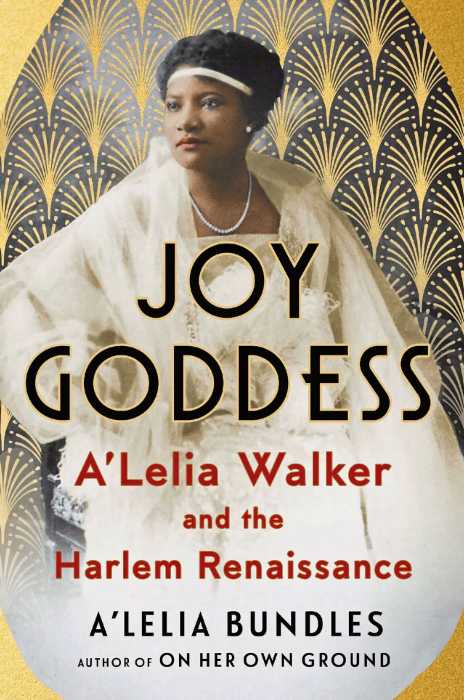Ben Platt and Rachel Bay Jones in Steven Levenson, Benj Pasek, and Justin Paul's “Dear Evan Hansen.” | MATTHEW MURPHY
“Dear Evan Hansen” is the story of a boy whose lie spins out of control, explodes across social media, and takes on a life of its own, at which point truth becomes irrelevant. If there were ever a musical for our time awash in so-called fake news, this is it. Even more disquieting is the notion that when Evan’s lie is finally uncovered by the people most hurt by it, they choose not to expose him because the lie made people feel good and everyone needs to feel good.
What we’re talking about is suicide, an incredibly difficult event to understand or accept. Evan is a troubled, socially inept teen, a loner who shies away from human contact. When a therapist suggests he write letters to himself as encouragement, he does so. One letter is stolen by a bully, Connor, who subsequently, and for reasons unknown, kills himself. The letter, addressed “Dear Evan Hansen” is presumed to be a suicide note. Evan never knew Connor but through a series of events is thrust into what’s left of Connor’s family, who come to believe what is false because it comforts them. And so the legend grows that Connor wasn’t the disturbed young man who had tormented his parents but a poetic soul longing for expression, hurting in a cruel world. Evan is swept along as the story goes viral, gratified at finally being noticed and celebrated and basking in the attention and approbation he’s receiving.
For those of you who are paying attention, this is how religions are created and how Donald Trump took the White House. As for Evan, after he finally comes clean, his mother comforts him by saying people will forget. While that may be the case, the truly insidious truth is that in adopting a palatable narrative, the characters avoid harsher truths and moral questions and absolve themselves from responsibility in a tragedy. As I said, a musical for our time.
Two new musicals romanticize less admirable human qualities
Mine is admittedly a contrarian view of a musical that had powerful regional and off-Broadway runs and has moved to Broadway with glowing reviews. Despite my disquiet over the story’s morality, this is, for the most part, a well-made musical. Though Steven Levenson’s book is sketchy and characters’ motivations are often undeveloped, he has a terrific sense of the language of teens and both the harshness and tenderness of that time of life. The rock-infused music and lyrics by Benj Pasek and Justin Paul are appealing, if not overly sophisticated, but they seem appropriate for the simplistic nature of the story. If it feels somewhat formulaic, that’s consistent with a tale that wants its darkness… but not too much. If anything, the show points up how much of social media today is inherently self-involved and presentational, allowing people to skirt by deeper issues all the while garnering attention. On some level, a deeper humanity is minimized, but that’s the world we live in.
The cast, too, is bright and energetic. Ben Platt in the title role gives a detailed, if sometimes overly mannered performance that manages to make Evan appealing if not necessarily sympathetic. He’s a strong, focused singer, and if he flips up into falsetto too often blame the score. Platt’s technique is spot-on. Other notable performances include Mike Faist as Connor who has a quirky appeal as does Will Roland as Evan’s snarky friend (and co-conspirator) Jared. Kristolyn Lloyd is terrific as Alana, a girl who jumps on the social media bandwagon, and Rachel Bay Jones is adorably idiosyncratic as Heidi, Evan’s mother.
Michael Greif directs with style, and David Korins’ set with Peter Nigrini’s projections convey the overwhelming power of social media in today’s world — for good or ill.
Despite my reservations, it is easy for me to understand the appeal of this show, even though from a dramatic and character standpoint the piece is unsatisfying. As theater or dramaturgy, Evan being let off the hook is not the same as his finding redemption, hard as this piece tries to make those two things the same. It’s a false equivalency: the former is facile, the latter is literature.
Bobby Conte Thornton and Nick Cordero in Chazz Palminteri's “A Bronx Tale.” | JOAN MARCUS
Tedium sets in early in “A Bronx Tale: The Musical.” Based on Chazz Palminteri’s one-man show about his life growing up in – you guessed it – the Bronx. It’s the story of a young man torn between the romantic life of a gangster and the straight-and-narrow, but painfully prosaic life of an honest working man. This is familiar stuff, but it’s better suited to a monologue than the sprawling, derivative musical now on Broadway.
The show arrives feeling dated with echoes of “Jersey Boys,” “West Side Story,” “Guys and Dolls,” to name just three. Palminteri, who also wrote the book for this, strains to make a coherent narrative of it. The story starts out as the coming of age story of Calogero, Palminteri’s stand-in, and then veers off, introducing issues of race and conflict between neighborhoods that are clunky and clichéd. The characters are undeveloped, which makes emotional connection to any of them virtually impossible and renders them stereotypes. Worse, the use of Calogero as a narrator removes any immediacy from the story, bathing it all in a miasma of nostalgia that quickly cloys.
The usually gifted Alan Menken’s score is largely pastiche as it careens from doo-wop to cocktail music to noisome easy-listening ballads. Particularly awful is a song “One of the Great Ones,” which recalls nothing so much as Dean Martin on a variety show from the 1960s. And “Roll ‘Em” is a complete knock off of “Luck Be a Lady” (the showstopper from “Guys and Dolls”) without the original’s style, melodic urgency, or sex appeal. As you might imagine given the derivative banality of the music, Glenn Slater’s lyrics are similarly lacking, with amateurish rhymes that thud into place.
This is all too bad, not just because you’ll waste money and two hours on this show but for the waste of talent involved in the cast. Nick Cordero as the gangster Sonny has extraordinary stage presence and charm. If the performance is reminiscent of the one he gave in “Bullets Over Broadway,” that’s because the characters are similar. But he’s a powerful singer who can make even a trite song seem lush. Richard H. Blake as Lorenzo, Calogero’s father, is equally strong. Bobby Conte Thornton makes a welcome Broadway debut as Calogero, with a fine voice and charming personality. Robert De Niro and Jerry Zaks are credited with direction, and there are some fine moments, particularly in the creation of the street life on Beowulf Boritt’s imaginative set. Choreography by Sergio Trujillo is fresh and often exciting.
None of this, however, is sufficient to overcome the lack of anything breathtaking or new in this tale, making it as bland and predictable as an oft-read bedtime story. Lord knows, it certainly came close to putting me to sleep.
DEAR EVAN HANSEN | Music Box Theatre, 239 W. 45th St. | Tue.-Thu. at 7 p.m.; Fri.-Sat. at 8 p.m.; Sun. at 7:30 p.m. | Sat.-Sun. at 2 p.m. | $79-$175 at telecharge.com or 212-239-6200 | Two hrs., 25 mins., with intermission
A BRONX TALE | Longacre Theatre, 220 W. 48th St. | $50-$187 at telecharge.com or 212-239-6200 | Two hrs., 10 mins., with intermission



































